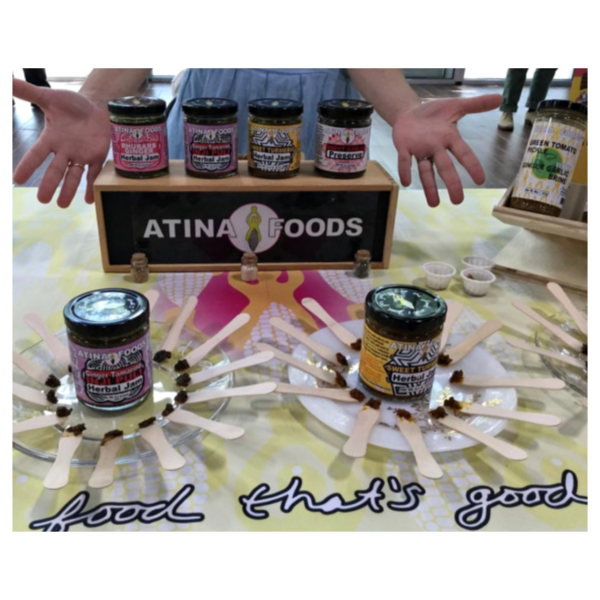Photographs courtesy of Atina Foods
The field of nutritional psychiatry is in its infancy, but the link between diet and mental health has never been clearer. Multiple studies have linked diets high in refined sugar with impaired brain function and mood disorders, including depression and anxiety.
Serotonin, a neurotransmitter that regulates moods, appetites, and sleep, is believed to be the essential link between our stomach and brain, according to Harvard Medical School’s Health Publishing arm. About 95% of our serotonin is created in our gastrointestinal tract, and the foods we eat can either contribute to or deplete that serotonin. A typical Western diet — high in refined sugar and saturated fat — has been linked to higher rates of depression than classic Mediterranean and Japanese diets. These diets are both typically high in unprocessed “whole” and fermented foods, both of which have been shown to boost levels of “good” bacteria in guts, and elevate serotonin levels.
We sat down with Carrie Dashow and Suresh Pillai of Atina Foods to discuss why the world needs pickles and ferments more than ever. They also shared delicious recipes. Read on for the scoop.

Left to right: Carrie Dashow and Suresh Pillai of Atina Foods
NEW YORK MAKERS: Can you share insight into what you two aim to do with Atina Foods?
CARRIE DASHOW: Our goal is to produce and share holistic food. While some of our products are made with their original ingredients, we have adapted to making many of them with local ingredients that we either grow ourselves on our 1.5 acres in Catskill NY, or from nearby farms that we have built relationships with and grow food sustainably. Our recipes are based on the traditional knowledge systems of Ayurveda, the sacred wisdom of the ancients, and recipes that have been passed down through culture and family. When possible we use local produce for our range of uniquely tasting Fermented Pickles and Power Jams. We prefer to use whole ingredients rather than powdered and extracted. This helps to preserve the original potency of the plants nutritional power, actually adding vitamins, minerals, and probiotics through the fermentation process. Our products are also naturally shelf stable, with no preservatives!

NYM: That’s very involved. It’s fascinating to see how deeply your philosophical beliefs are woven into your business model. Did you both have a background in food?
CD: I have worked for years as an artist and still do, and Suresh has worked in the cultural arts as well as journalism. He began cooking with the women in his family at a very young age, and loves cooking the dishes he was surrounded by growing up in Kerala, Western Ghats, South India. Ayurvedic health practices are still practiced regularly in Kerala, and it is by tradition that food has long been considered a medicine, and eating for health as customary.
When we met, I didn’t realize what an amazing cook Suresh was or how agile he was with balancing flavors, a talent he has honed cooking with family and friends along his worldly travels. When we moved to the Catskills together, he began experimenting with the wonderful local ingredients we have here, and one thing led to another.



NYM: With such diverse backgrounds and experiences, how did you come together as a couple, and then decide to launch the enterprise?
CD: We first met in India on the second day of January in 2012 after a tropical cyclone. I was on an artists’ residency, while he was working nearby on a community museum project. A mutual friend had suggested we meet previously, but this didn’t happen until we were all hit by a massive tropical hurricane. The location we were in was quite (though momentarily) devastated, we were kind of thrown together by the cyclone, always a crisis to bring us together! Eventually Suresh made his way to the USA and we moved to Upstate NY, Atina Foods emerged about a year later and we launched the company together in 2015.
An acupuncturist friend was working with a cancer patient and asked us if we could make her foods that would tone down her symptoms so he could treat her. Prescriptive cooking, experiments we had begun with fermenting in the style of South Indian Pickles with local produce, along with growing of our own food -- things began to just make sense. We live on land [in Catskill] that was once Mohican territory, directly at the foothills of the Wall of Manitou, the Catskill Mountains. Overlooking our property is an effigy to Madonna, the holy mother. One day, the name Atina came to us. Atina, we learned, is the corn goddess, who brought the Mohican people out of darkness, bringing together people and animals to work together and with the land. We look to these female deities as our great mother goddess. To us, Atina encompasses the spirit of the place where we are, our backgrounds, our philosophies, and a way to move forward.



Peeling turmeric with the Boys and Girls Club
NYM: I keep reading reports about people wanting comfort food, but also wanting to return to a more sustainable and holistic way of life during this crisis. What are you seeing on the front lines in terms of sales and what people seem to be responding to in your line?
SURESH PILLAI: The most important basic lesson that we all learn from the present pandemic is that the natural immune system of human beings is compromised by various reasons mainly because of unhealthy eating habits. Natural food is something which provides not only carbohydrates, proteins, and fat but also must provide vitamins, essential amino acids, digestive and other enzymes, metals, minerals, and similar natural chemical compounds which are essential for the body to build and retain its natural resistance or immune system. As many reports have suggested, the deaths due to coronavirus have happened mainly because the affected person could not fight back or lacks immunity. As we can see from the common eating habits of a majority of people in this country, they do not include essential vitamins, etc. to help the body to build its natural immune system. It is important to remember in this occasion that spices, vegetables, and fruits are the main natural sources of these immune building chemical compounds. Unfortunately most of these natural chemicals are sold as "medicines" through pharmacies as well as American cooking methods/recipes are generally void of including spices which can contribute to a state of reduced immunity. Our products based on Ayurvedic tradition are full of natural spices which help the body to build its natural immunity. While it is important to develop vaccines to fight viruses, it also important to develop healthy eating habits which help the body to fight against external enemies.
CD: I can’t say enough about the inspiring and truly heartfelt response we have gotten from our products under normal circumstances and especially right now. Maybe it is a search for nourishment, a hunger for roots, to be in touch with each other and the land we live. From climate change to an increase in autoimmune disease, is a result of our strained relationship to the earth. I can only hope that this crisis will bring about real and positive change. We are honored to do what we can to ground people physically and mentally. Our sales have increased significantly in the past month, and customers are writing us notes about how much more nourished and healthy they feel.


NYM: More and more healthcare professionals — from scientists and psychologists, to doctors — are linking not just physical, but also mental health with food choices. What foods would you recommend right now if people want to boost their moods and immune systems?
CD: For immunity and mood boosting, we would recommend to start with whole foods over extractions and powders. Some of our favorites are fresh turmeric and ginger rhizomes. These rhizomes boost immunity and reduce inflammation for starters, this can help stimulate the release of serotonin. Our Turmeric Ginger Salt Pickle and Turmeric Ginger Herbal Jams are beyond delicious ways to get these.
Garlic Scapes, besides being (one of) my favorites and so fun to eat, are a great way to boost immunity without all the stink! Our Garlic Scape Pickle is locally grown with no pesticides, we lacto-ferment it with salt -- no water! It is a delicious twist on a local produce! If you are feeling a bit sick, the Rhubarb or Tamarind Ginger Herbal Jam are both wonderful digestifs and herbal expectorants...besides being divine in their balance of the 6 tases of Ayurveda.
--
As Suresh and Carrie point out, while we may feel powerless in this present crisis, something we can control is what we put into our body. Making thoughtful decisions about eating responsibly grown and prepared food that will nourish and sustain our minds and bodies may help contribute to our — and the greater environment’s — healing process.
Below, recipes shared from Atina...

Atina’s Turmeric and Ginger Salt pickle Dressing -- For everything!
Atina’s Inji Puli & Rhubarb Ginger Frosting
1 stick of unsalted butter (your choice, include vegan options),
2 cups powdered sugar,
1 Tablespoon any milk,
1 ½ Tablespoons Atina Foods’ Inji Puli, Ginger Tamarind, or Rhubarb Ginger Herbal Jam,
1 teaspoon vanilla
Whip all the ingredients together. Use as an icing and piping for cakes, cookies, cupcakes!
Recommended on plain chocolate cake. Gingerbread and banana would also be great. Store remaining frosting in the fridge, it lasts several months. To use again after refrigerated, bring to room temp and re-whip lightly.
Atina’s Thiyal, Coconut Cooking Paste
Boil 1/2 cup of water
Dissolve 1/2 the jar of Atina's Thiyal into the water,
Vegetarian version: Cut about 1 lb of root vegetables into 1 inch size (carrots, kohlrabi, eggplant, onions, potatoes, sweet potatoes, radish, turnips, tomatoes, etc.) -- whatever you have!
Meat version: Same but with your choice of meat.
Mix thoroughly.
Cook on low fire, mix often, make sure it doesn’t burn, for about 15 minutes.
Ready when roots are cooked to tender.


Leave a comment